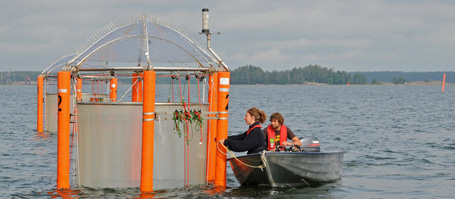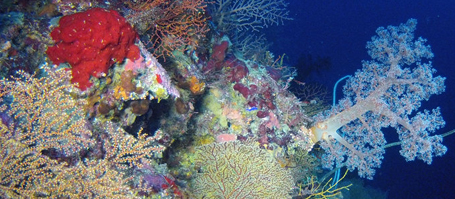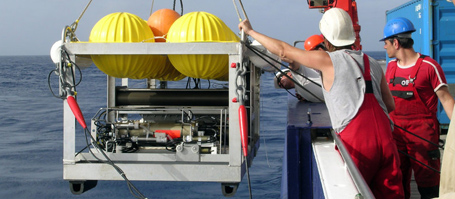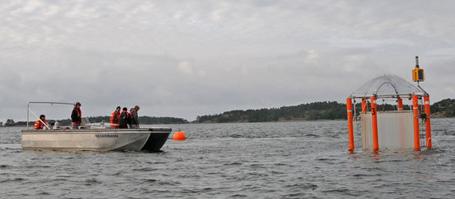The Federal Ministry of Education and Research (BMBF) is supporting the three year project with 8.77 million Euros. The coordination is being carried out by GEOMAR | Helmholtz Centre for Ocean Research Kiel.
The ocean captures approximately one third of the carbon dioxide produced by the combustion of fossil fuels – a priceless “service” that slows global warming considerably. Yet chemical reactions lead to ocean acidification and a reduction in available carbonate ions. This exact ion, however, is essential for calcifying organisms – plankton, mussels, snails, crabs or corrals – to build their shells and skeletons. Will they be able to adapt to this change? At what price? How will the food web change when small and large organisms react to the acidification?
“That the oceans are acidifying due to rising carbon dioxide emissions is now a proven fact. However we can only guess at the extent of the consequences” explains Ulf Riebesell, professor for biological oceanography at GEOMAR | Helmholtz Centre for Ocean Research Kiel. Under his direction, 14 German institutes have been researching the most pressing questions of ocean acidification for BIOACID (Biological Impacts of Ocean Acidification) since September 2009. In September 2012 the second phase of BIOACID begins. The Federal Ministry of Education and Research (BMBF) is supporting the project with 8.77 million Euros for the next three years. Riebesell says “Important insight from the first phase is the fact that young stages of many organisms are especially influenced by ocean acidification. Thus the development of, for example, cod larvae is impaired by acidification. Long-term studies might show that some organisms are capable of adjusting to the ocean acidification. “A new aspect is that we can now examine the “services” of the ocean and more clearly show which functions relevant to humans are being damaged. For example the combination of ocean acidification and overfishing can lead to us not being able to obtain as much food from the ocean” says project leader Riebesell.
The planned laboratory and field experiments will consider more environmental factors than before. “BIOACID research has shown that the influences of climate change and ocean acidification on ocean inhabitants can amplify each other” explains Prof. Riebesell. “Through further local factors like overfertilization and pollution the reactions can be even greater than the sum of the individual reactions.” The interaction of competing organisms and predator-prey relationships will also be focused on more in the investigations. Ecosystems that have developed around natural CO2 sources serve as a comparison and as a view into the future. “Who are the winners and losers of ocean acidification? How does exchange of substances change within biocoenoses? These are questions we can observe in natural biocoenoses.”
With the continuation of BIOACID, German research in the area of ocean acidification remains in a leading position in international comparison. An important prerequisite here is interdisciplinary and inter-institute collaboration. In addition to the cooperation of the 14 partner institutes, there is a strong connection to other national and international research projects like the British UK Ocean Acidification Research Programme (UKOA) and the EU project Mediterranean Sea Acidification in a Changing Climate (MedSeA), lobbyists such as the International Ocean Acidification Reference User Group (IOA-RUG) and the newly founded Ocean Acidification International Coordination Centre (OA-ICC).
Project partners of the second phase of BIOACID are:
Alfred Wegener Institute of Polar and Ocean Research, Bremerhaven
Carl von Ossietzky University Oldenburg
Kiel University
Heinrich Heine University, Düsseldorf
Helmholtz Centre of Material and Coastal Research, Geesthacht
GEOMAR l Helmholtz Centre for Ocean Research Kiel
Institute for the World Economy
Leibniz Institute of Freshwater Ecology and Inland Fisheries, IGB, Berlin
The Leibniz Institute for Baltic Sea Research Warnemünde
Leibniz Center for Tropical Marine Ecology, Bremen
MARUM – Center for Marine Environmental Sciences, Bremen
Max Planck Institute for Marine Microbiology, Bremen
University of Bremen
University of Rostock
University of Koblenz-Landau
Links:
www.bioacid.de BIOACID-Homepage
Contact:
Prof. Dr. Ulf Riebesell (GEOMAR, FB2-BI)
Tel.: 0431 600-4444
uriebesell@geomar.de
Maike Nicolai (GEOMAR Communication & Media)
Tel.: 0431 600-2807
mnicolai@geomar.de
…



